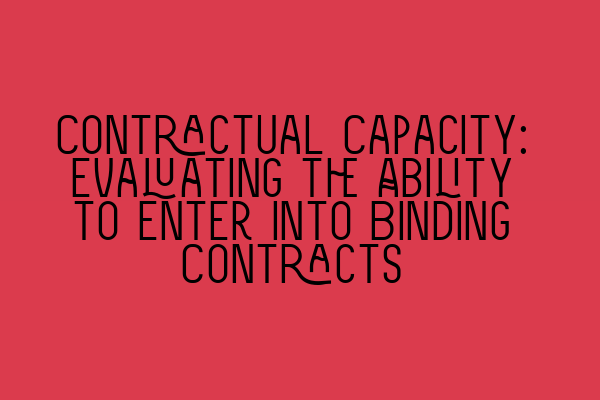Contractual Capacity: Evaluating the Ability to Enter into Binding Contracts
Entering into a contract is a fundamental aspect of conducting business and maintaining legal relationships. However, not everyone has the same level of capacity or ability to enter into binding contracts. It is essential to understand the concept of contractual capacity and its implications to ensure that contracts are valid and enforceable.
What is Contractual Capacity?
Contractual capacity refers to the legal ability of a person or entity to enter into a binding contract. It primarily pertains to an individual’s mental and legal competence to fully understand the terms and consequences of a contract. Without proper contractual capacity, a contract may be voidable or even void.
Contractual capacity is an essential factor in determining the validity of a contract, as it safeguards individuals from being exploited or coerced into agreements they do not fully comprehend. It also promotes fairness and protects vulnerable parties who may lack the necessary understanding or capacity to make informed decisions.
Factors that Affect Contractual Capacity
There are several factors that impact an individual’s contractual capacity:
- Age: Age plays a crucial role in contractual capacity. Minors, typically individuals under the age of 18, are considered incapable of entering into contracts, except for certain essentials like necessities.
- Mental Capacity: Individuals who lack the mental capacity to understand the terms and implications of a contract may not possess contractual capacity. This includes individuals with mental illnesses, cognitive impairments, or those under the influence of drugs or alcohol.
- Intoxication: Being under the influence of drugs or alcohol can impair an individual’s ability to comprehend a contract’s terms and conditions. In such cases, contractual capacity may be affected.
- Coercion and Undue Influence: If a party is coerced or unduly influenced into entering a contract, their contractual capacity may be undermined. In these instances, the contract can be voidable.
Evaluating Contractual Capacity
When entering into a contract, it is essential to assess the contractual capacity of all parties involved. This evaluation ensures that the agreement will be legally enforceable and minimizes the risk of disputes arising from lack of capacity.
To evaluate contractual capacity, consider the following steps:
- Age Verification: Determine the age of the party involved. If they are a minor, assess whether the contract falls within the exception for necessary items or services.
- Mental Capacity Assessment: Evaluate the mental capacity of the individual. If there is any doubt about their ability to understand the contract, seek expert advice or consider obtaining consent from a legal guardian or relative.
- Sobriety Check: Assess if intoxication may impair the individual’s ability to fully comprehend the contract. If necessary, delay the contract signing until sobriety is achieved.
- Coercion and Undue Influence Evaluation: Investigate whether any party has been coerced or unduly influenced into entering the contract. Ensure that all parties enter into the agreement willingly and with a clear understanding of its terms.
It’s important to note that contractual capacity is not a one-size-fits-all concept. Different jurisdictions may have specific laws and regulations surrounding who can enter into contracts and under what conditions. Therefore, it is crucial to consult with a legal professional or solicitor who can provide expert guidance tailored to your specific situation.
If you need assistance navigating legal challenges and pitfalls in your practice, you can consult our related article: Navigating Legal Challenges and Pitfalls in Your Practice.
For a comprehensive comparison between barristers and solicitors, check out our related article: Barrister vs. Solicitor: A Comprehensive Comparison.
If you are interested in understanding the SRA Competence Statement, our guide for solicitors can provide valuable insights: Understanding the SRA Competence Statement: A Guide for Solicitors.
Exploring different solicitor specializations? Our article can help you find your niche: Exploring Different Solicitor Specializations: Finding Your Niche.
Looking for top recommendations for law schools in the UK? Check out our article: Top Recommendations for Law Schools in the UK.
Remember, understanding and assessing contractual capacity is vital to ensure the enforceability and validity of contracts. By considering the factors that affect contractual capacity and taking appropriate steps to evaluate it, individuals and businesses can engage in contracts with confidence and legal certainty.
